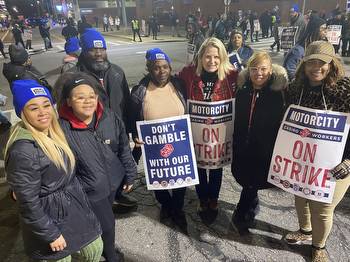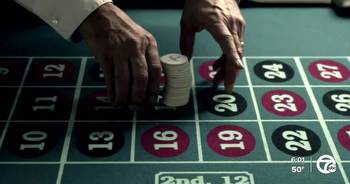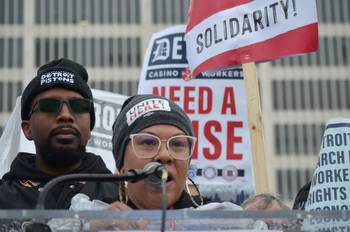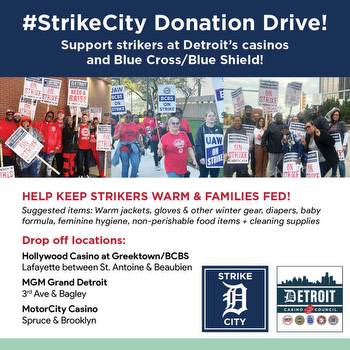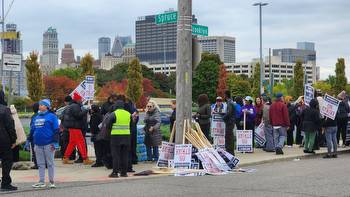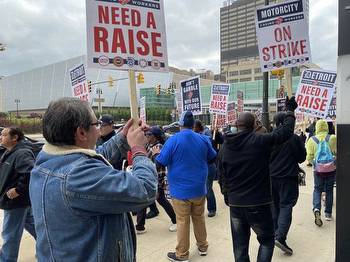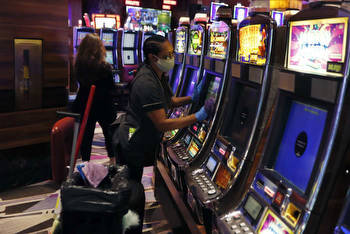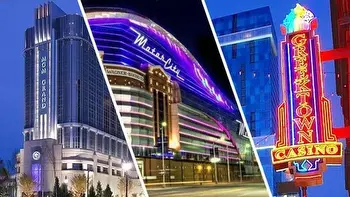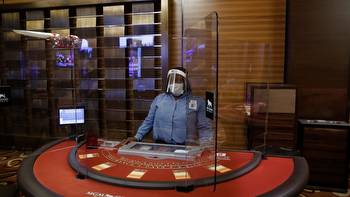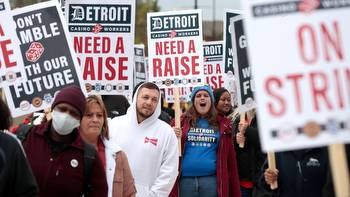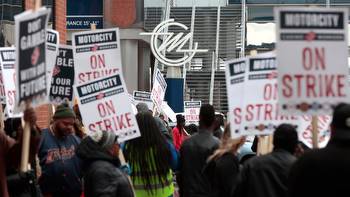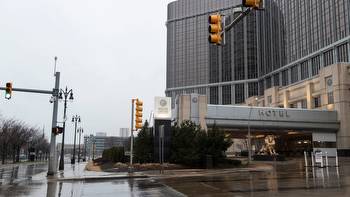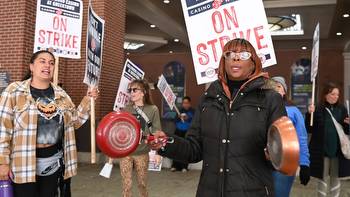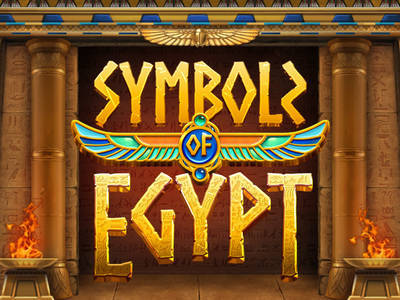The Detroit casino workers strike, explained

Kolada Richardson returned to work cleaning hotel rooms at Detroit’s MGM Grand in May 2021 after more than a year off the job. When the casinos closed because of the COVID-19 pandemic, she weathered unemployment only to find that her job had gone from tough to brutal.
Many of her coworkers didn’t return, and the hotel was short-staffed. Ten-hour days of making beds and scrubbing toilets was the new normal, up from her usual eight-hour shift.
She worked under time pressure for $17.70 an hour, plus overtime. MGM Grand allowed housekeepers 45 minutes to clean a room with two queen beds or 30 minutes for a room with a single king bed. If partying guests left a mess, tough luck; she still had the same amount of time to clean it. She had to get through 12 to 16 rooms a day. Shifts could easily stretch to 11 or 12 hours of physical labor.
“That’s why we’re broke down the way we are,” said Richardson, who switched to stocking minibars for an extra $1 an hour just before the strike. “People have health problems. People are having knee (and) back surgery because of the toll it takes on our bodies.”
Richardson is one of the thousands of workers who launched the first casino strike in Detroit history, walking off the job at MGM Grand, Hollywood Casino at Greektown and MotorCity Casino Hotel on Oct. 17.
Workers are demanding higher wages, better healthcare and job security. Around-the-clock picket lines are putting financial pressure on the casinos — not to mention the City of Detroit, which relies heavily on gambling tax revenue.
Yet the casino strikers may face an even tougher fight than United Auto Workers (UAW), who recently won major concessions from the Detroit Three auto companies.
The casinos remain open. Significant gaps remain between the negotiating parties’ wage and healthcare proposals. At the same time, cold temperatures and limited union funds could eventually make the strike more difficult for strikers.
“Trying to get people not to gamble is a whole other ball of wax,” said Michelle Fecteau, director of the Center for Labor and Community Studies at the University of Michigan-Dearborn. “It’s a whole different industry.”
Jason Barczy, a spokesperson for MGM Grand, declined to answer questions about workers’ demands. The other two casinos did not respond to requests for comment.
Here’s what we know about the strikes and their potential impact.
Who is striking?
The Detroit casinos are hotels, spas, restaurants, bars, concert venues, and gambling operations. They generated $1.2 billion in revenue last year, and they employ thousands of people.
The strike is organized by the Detroit Casino Council (DCC), a group of five local union chapters that together represent 3,700 workers in a wide range of jobs.
- Unite Here Local 24 represents slot machine attendants, all non-managerial food and drink workers (including line cooks, bartenders and waitstaff) and hotel hospitality (including housekeepers, front desk staff, guest room attendants and facility cleaners).
- UAW Local 7777 represents poker and blackjack dealers, slot attendants and other workers in casino gaming areas.
- Teamsters Local 1038 represents player services workers and valets. Player service workers greet customers and monitor the floor for rule violations.
- Operating Engineers Local 324 represents engineers. They maintain gambling equipment and casino technology.
- Michigan Regional Council of Carpenters represents carpenters. They repair any damage to the physical structure of the casino.
Each casino has a single contract with the DCC. The member unions have representatives who focus on their specific issues during negotiations.
Workers under UAW Local 7777 make $500 a week in strike pay. A DCC spokesperson who would only speak on background said the amount of strike pay differs for each union but would not disclose the amounts.
Have questions about the strikes? Text “STRIKE?” to 67485.
Message frequency will vary. Message and data rates may apply. Reply HELP for help or STOP to cancel. Please read our terms of service and privacy policy.
What are workers’ demands?
Pay is at the top of the list. Workers want a $3.25 per hour raise in the first year of the new contract, DCC leaders said in a video released Nov. 4. So far, the casinos have offered a $1.95 raise.
Healthcare is the second demand. Casino workers want consistent health benefits with no monthly premiums. DCC leaders said in the video that casino managers wanted workers to pay $60 in premiums per month. Managers have since offered to make premiums $40 per month.
Workers make an average of $16.33 an hour across the three casinos. UAW Local 7777 chairperson Kimberly Syfax is a table dealer at Hollywood Casino at Greektown. She said she’s only seen a $7 increase in her 22 years there.
The old contract was ratified in 2015. It expired in 2020, but workers voted to extend it because of the pandemic. Since then, they received a 3% pay increase while inflation increased 20%.
The unions say they expected to receive much more when they returned to the bargaining table but were rejected.
“We sacrificed our wage increases,” Syfax said. “We sacrificed our vacation time … for the last eight years. Now, it’s time for them to give us what we gave up.”
How is the strike impacting the casinos?
Money was still flowing at MotorCity Casino on Tuesday night. Outlier Media walked through the main gaming floor, where hundreds of customers played slot machines and table games. The Strut Bar and dozens of gaming tables were staffed and surrounded by patrons.
Still, the casinos are operating at reduced capacity. Some restaurants, bars, valet service, gambling areas and spas are closed.
Striking workers “are talking about their money, but what about my money?” a casino patron told Outlier on Tuesday. “None of them ever came over here to tell me, ‘Good luck, I hope you win.’”
Casino managers and City of Detroit officials declined to say how much money the casinos — and, by extension, the city — are losing because of the strike.
The Michigan Gaming Control Board will report revenue figures for October later this month.
Casino strikes face a unique challenge. No one is hooked on car manufacturing, but gambling addiction is a diagnosable disorder. People willing to endanger their relationships and financial well-being to gamble are likely willing to cross a picket line.
For help with problem gambling in Michigan, call 800-270-7117.
What does the strike mean for the City of Detroit?
Before the strike, casinos brought $450,000 in taxes daily to the City of Detroit, making them the third-largest tax generator for the city.
The city expects to bring in an additional $158.5 million from on-site gambling and $89.8 million from online gaming this fiscal year, Stephanie Davis, communications manager for the Office of the Chief Financial Officer, said in an email.
Last month, the City Council passed a resolution supporting the strikers after hundreds of casino workers attended a public meeting, both online and in person.
“The City of Detroit is prepared to manage through short-term disruptions in revenue because the Mayor and City Council have worked together over the years to create a fiscal plan that is based on financial resiliency,” Davis said in an email.“We are hopeful that a fair agreement can be reached between the casinos and the casino workers’ unions soon.”
John Roach, a spokesperson for Mayor Mike Duggan, declined to comment on the city’s involvement in negotiations.
What does strike mean for other service workers across Detroit?
The outcome of the casino strike could have ripple effects across Detroit’s service economy. The casinos are large employers in the sector, and their competitors could be pushed to match any wage increases they agree to. The unions representing the casino workers could use a victory to encourage other workers to unionize.
Casino workers are just some of the thousands of other workers on strike since September, including 250 workers at Detroit nursing homes. When the UAW ended its six-week autoworkers strike late last month, the new contracts included double-digit wage increases.
Shytia Burton, a warehouse attendant at MGM Grand, said the UAW’s win proves the casino workers’ strike will be worth it.
“It gives everybody a little bit of courage to not be scared of these companies,” said Burton, who’s worked at MGM Grand for more than a year. “It’s been great to see that we’re actually on the same page.”
Many of the 3,700 striking casino workers are in the leisure and hospitality sector. Federal data for 2022 lists 65,197 leisure and hospitality workers in Wayne County, which includes Detroit, but doesn’t specify a figure for the city.
Many workers in this sector across Michigan are unionized. While the specific number of unionized workers in Detroit is unclear, we know there are more than 6,000 unionized hospitality workers across Michigan and Ohio through Unite Here. Nearly 1,300 food and beverage workers are unionized under Teamsters Local 1038 (with 6,600 workers in the union across Detroit and Port Huron). Operating Engineers 324 has 14,000 union members, while another 14,000 carpenters are unionized under the Michigan Regional Council of Carpenters statewide.
What does public support for these workers look like?
Striking isn’t easy. With freezing temperatures in the forecast, strikers have put buckets out for public donations to augment workers’ limited strike pay.
Beyond donations, the public can help by not crossing picket lines, Syfax said. The workers will have less leverage at the bargaining table if the casinos aren’t feeling financial pain from the strike.
She added that the picket line extends to online gambling, a large and growing revenue source for the casinos.
Richardson said the pain of striking is better than stagnant pay and unsustainable working conditions.
“I think we had already been frustrated and tired,” Richardson said. “It took its toll. We were ready.”








